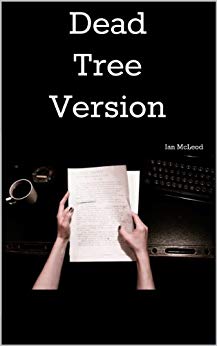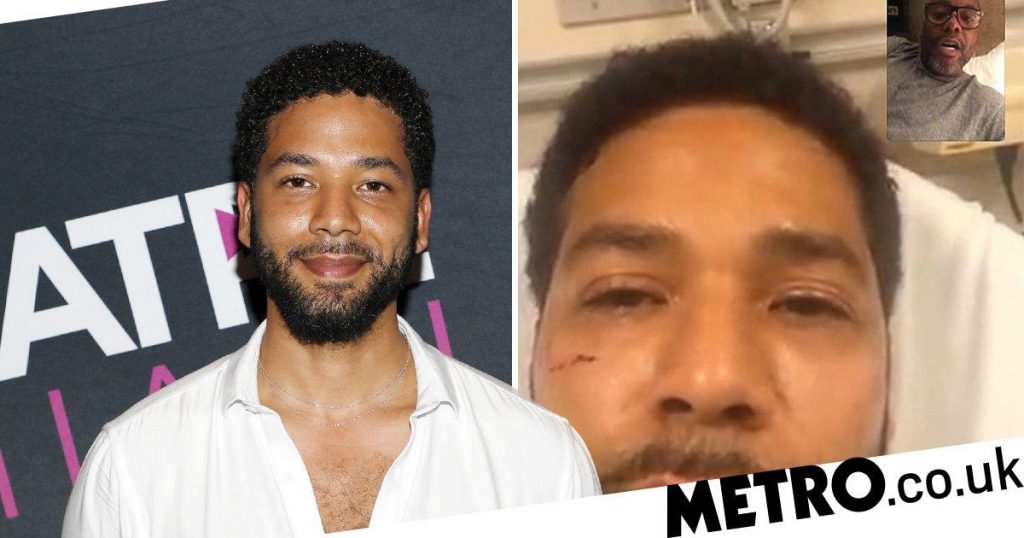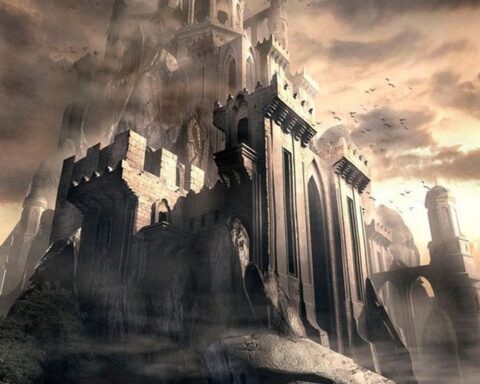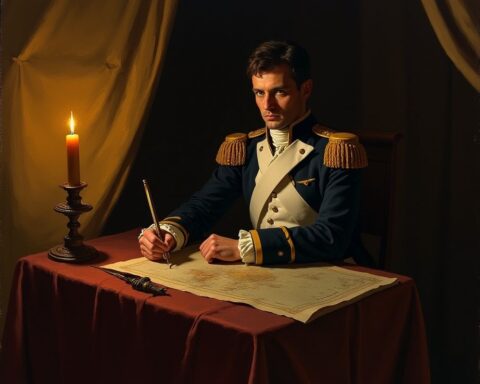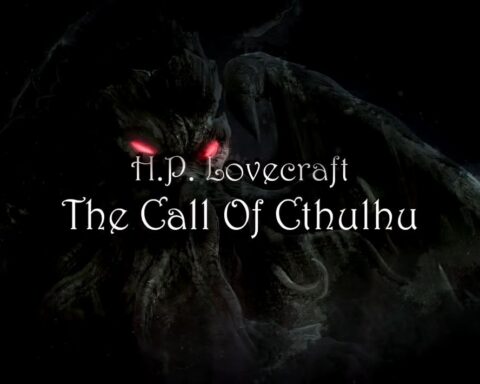Chapter 6: Anomie Anemone
Our Hero wasn’t happy with the story so far. He’d just written his chapter mirroring the ideological speech from Achilles Stood by She Who Must Not Be Named. Our Hero wrote 87 pages of utter bullshit that could only pass for a coherent life-philosophy in young adult fiction–much like the young-adult hit, The Nuances of Knowing a Narcissist.
Little did he realize that lyricists would, one day, find gold in the steaming piles of wordshit he’d dumped on paper. One day in the not too distant future, the up-and-coming band Cockblock Manifesto would perform a song based on Professor Aldridge’s anecdote of a fisherman pining for the beautiful salmon he’d allowed to swim upstream. Indeed, CBM’s chart-topper would inspire white protestant upper-middle-class women everywhere to dump their boyfriends and end up in the mighty jaws of grizzly bears–or at least alone with lots of cats.
Love songs were often written by people like Our Hero (though he’d never written one himself.) He laughed at this realization, it didn’t bother him because when he tried, he could get just about anywhere with a gal. He was too reliant on inertia to try that hard.
What did bother him was the realization that the songs were sung by people who had sex with more women than there are women. This, to Our Hero, was a great cosmic injustice (though he himself did not take it personally, due to its cosmic scale.) Nonetheless, he saw a karmic imbalance that must be reconciled somehow. Or perhaps there was no imbalance? He altered his perspective and wondered for a moment if one particularly infamous suicidal musician had, in a previous life, been a eunuch, and his brief but euphoric life as himself was cosmic reparation for being head-chamberlain to a voluptuous Persian princess in antiquity. Our Hero was most amused, but realized he must get back to writing. After all, the USDA would soon realize he hadn’t been to work in two weeks, and his free paychecks would come to an end.
The thought of being broke did not strike him as problematic. He had no family, no children. He could always be like the homeless Professor Aldridge and roam about Chicago dispensing philosophy and displays of public indecency at whim. And at that, he began writing the next scene, which began with a display of indecency so indecent it would result in the book being banned in Berkeley.
His writing was interrupted by one of those rebellious thoughts for which he didn’t much care: he didn’t really want to be with anyone right now, which meant that he actually did and was feeling quite lonely. He’d loved Liz. He still loved Liz. Liz despised him, and rightly so. He didn’t know why he loved Liz. He’d never really loved anyone else. Sure, he’d had plenty of “meaningful relationships” and loved those women, too, but Liz was…Liz.
In her place was the self-described “mostly-celibate-psycho-lesbo-nympho-saint-from-Hell,” Carrie. He never really thought of Carrie as anything but Carrie. She wasn’t a girl. She wasn’t one of the guys either. She was just Carrie. Just Carrie is wrong. She was Carrie, dammit! Sure, Our Hero had, at times, had natural biological responses a healthy man has when around a rather attractive member of the opposite sex, but he didn’t entertain them. She and Our Hero had discussed various aspects of this back in the Adventuring Days, but in a strange matter-of-fact way. Of course, Our Hero was not a noble man–he cracked jokes about it and said things any straight White Anglo-Saxon Protestant with a healthy libido would say. But hell, she teased him more than he teased her.
Our Hero pondered the fight they’d had two days prior. They were both over it. Things were fine. They’d had far worse spats in the past. But something about it still bothered him. He knew she was right—everyone was right. He was three people. He really had been cobbled together from what God left lying around the workshop. [G-d’s note: no.] One minute he was, as he was then, overly introspective, anxious, neurotic, and alone. The next he breezed through life with a cool confidence no one could imagine.
Our Hero was a writer. Not just any sort of writer, but one who believed wholeheartedly in Faulkner’s “old verities.” His novel was a complete bastardization of everything he believed good literature should be. It was satire, of course, which in itself is good literature, but he couldn’t shake that God-Burt dream, either. What if he really was about to destroy civilization? Maybe he was taking things a little too far.
It was too late at that point. He wasn’t going to stop. He was half finished, and in record time. He couldn’t have done better on dextroamphetamines. He loved every word, every meaningless bullshit word he’d written. His favorite lines from his beloved homeless professor so far:
“If the world disagrees with ye, be ye disagreeable unto the world.”
“Most lives are little more than meandering run-on sentences, punctuated with a dagger. Sometimes literally.”
“Attempt to make love with everyone you meet.”
“Drugs? Yes.”
“Religion is the opiate of the masses. The past half-century–especially Nancy Reagan and Timothy Leary and the counterculture–have conspired to teach us that drugs are good. Therefore, be religious–and when at all possible start your own.”
“Alcoholism is the ground-state of a fertile mind.”
“Postmodernism is neither post-nor-modern enough. We must deconstruct the very idea that ideas can be deconstructed, but in order to do this we must first realize that unknowledge of knowledge is still knowledge. Oh wait, wasn’t that modernism?”
“Apply Christ’s reasoning to Kierkegaard and you’ll find that the Slave to the Aesthetic is greatest among ye, and the Knight of Faith is least.”
“Revere irreverence.”
“Be an iconoclast: burn the idols of the past. Piss on Mona, shred your Shakespeare, adorn Venus de Milo with a string of pearls and salvation shall be near!” [G-d’s note: Homeless philosophy professors do not make good poets.]
“Ignore all consequence, for whatever ye do or say, do all because it seemed like a good idea at the time.”
“Vote for the candidate with whom you most disagree–the end will be the same, you’ll never be disappointed, and you’ll blame the only one at fault: you.”
These sayings were not terribly controversial in and of themselves. In fact, Our Hero was not a very original philosopher: people had been saying more or less the same thing for the past century or so (except perhaps the last one.) What was controversial was the fact that Our Hero was putting them into a story that people would take entirely too seriously simply because he touched a nerve.
Our Hero was moderately displeased when he realized that there wasn’t anything terribly earth-shattering in his interrogation of the zeitgeist. The plot was thin. It had begun as a parody of a poem, and had over the course of writing become a shitty parody of She Who Must Not Be Named’s Rationalitarian epic mixed with his own personal anecdotes and odd hints at a Huguenot-esque alien involvement in the history of mankind to give a nice sci-fi undertone (via theories posited by Aldridge.) There was nothing good whatsoever about anything he’d written. Maybe, thought he, he should have stuck with the Ctrl-C/Ctrl-V formula of Rachel Tatum’s poetry.
It was too late to be thinking of such things. And he knew it was just self-doubt. He’d get published. Something told him he couldn’t not get published. He wrote for another hour or two, when he realized he’d been sleeping on the couch for far too long, so it was time to restore himself to the bedroom. He got up from his word-processor, dug through a cardboard box, found his bed-sheets and prepared to turn in. He made a mental note that he was still without a cell-phone, and tomorrow he would most definitely get a replacement. He mused for a moment, while brushing his teeth, that his not having a cell-phone for days had not at all affected his life.
He turned in for the night.
Meanwhile, Carrie was at her apartment painting her toenails. Her ex-girlfriend had just gotten off work. “Carrie, you left the water dripping again,” she said in her usual nagging tone. “It’s so damn irritating.”
“Sorry,” Carrie replied instinctively. She wasn’t paying enough attention to know what she was sorry for. It didn’t matter. There was a reason they weren’t together. Carrie wished Donna would leave, or that she wasn’t on the lease. She stayed anyway. Carrie had nothing to lose by being inattentive. It wasn’t so much passive-aggressive behavior on her part though, she wasn’t the type. It was more a genuine inability to pay attention to such trivialities.
“I haven’t seen you in days. We need to talk about this situation,” Carrie’s ex said.
Carrie sighed. “What situation?”
“I have a new girlfriend. She’s in the closet. We’ll be spending a lot of time here.” Donna said, matter-of-factly. It wasn’t a discussion. Carrie didn’t care what that dumb bitch did. She really didn’t.
“You’re telling me this…why?” Carrie asked.
“It’s only fair to tell you,” Donna said.
“Well, who the fuck is it?” Carrie finished her left big toe—she always left it for last. There was no why.
“Chick named Tara. She’s very sweet, and I don’t want you to make her uncomfortable with your blunt bullshit,” said Donna.
“I know Tara,” Carrie said. She didn’t really know Tara, beyond the events with Our Hero and prior encounters at the cafe, but she’d suspected the girl wasn’t exactly straight, or exactly comfortable with that fact, either. “If I were you, I’d be more worried about your blunt bullshit. Did you even think for two seconds about how to approach this conversation? You have no respect, no manners. Yeah, she’ll be good for you until you get bored telling her to go hither and yon.”
Donna, in an unusual turn of events, said nothing. Carrie watched the paint dry. “Poor girl.” If she’d had a flower, she’d have pulled the last petal off and cast it by the wayside. She had no flower, nor was she on any way, so she sighed. She didn’t have any feelings for the girl, except perhaps the compassion one feels for a squirrel another driver just flattened. “People do stupid things.”
She then thought about Our Hero, and wondered how he was doing. She felt bad for blowing up at him, yet she didn’t. She knew why she did, but she wasn’t going to explain it to him. He wouldn’t understand—that wasn’t mere rationalization, he really wouldn’t, and rather than try, she just figured the best course of action was to let the Universe restore balance, and then carry on as if nothing had happened. As usual.
But she wasn’t happy with any of it. She really wasn’t happy. She had two semesters left, then she’d go off to grad school and become an adjunct teacher or something. She didn’t want to be a teacher. She wanted to be an auto-mechanic, or an engineer, or a fighter pilot. She was lazy, and she knew it, that’s why she chose college and cafes and a luxury of prolonged adolescence. Unlike most Millennials, the anomie and ennui of the lifestyle was unbearable for her. As soon as her glittery purple toenails had dried, she put on socks and threw on a jacket. She was going to go see Darwin. It was late, but she didn’t want to be around the dumb bitch anymore, and really, who could blame her?
She hadn’t learned from Darwin’s mistakes. He had a degree in statistics, a study he loathed, and ended up in a miserable dead-end bureaucratic job which he’d just left for blissful unemployment—blissful until the money ran out, at least.
She walked. It was a long walk. The homeless were out. She thought about them, felt bad, but did nothing for them. After half an hour, she found herself at Our Hero’s building. Mrs. Lafferty was standing outside smoking a cigarette and feeding the stray cats, and kindly let Carrie inside. Carrie ran up the stairs and knocked on Our Hero’s door.
No answer. It was locked. It wasn’t that late, she thought. She tried again.
Inside, Our Hero was dreaming another bizarre dream. He was in full 16th century regalia at a banquet, and had full beard and long hair. He needed to urinate—painfully so, in fact. The host of the banquet was an iconic comedian from the forties through the sixties. There was a dwarf waiting on the table across the hall.
“Sir Brahe, I must say your theories are rather unsettling,” said a man who sounded less like he was from the 16th century and more like an old-time-radio star putting on a show at a renaissance faire.
Our Hero realized that he was being spoken to. “My name is Darwin, and I have no theory.”
“Surely you jest, good sir.”
“Oh Winchester!” called the comedian.
“Yes boss?” a gravelly voice replied from another room.
“Bring out some of that cheap mead for Mr. Brahe, he’s not drunk enough yet!”
Our Hero needed to pee, but he wasn’t in full control of his will. He felt it would be a great dishonor for him so to dismiss himself, so he stayed seated. Something about this entire sequence was familiar to him. Who was Brahe? Why was he Brahe? Probably some character in a TV show, he thought to himself. He realized it was a lucid dream at that point. But dammit, he really needed to take a piss.
“I have no theories,” Our Hero repeated. “I’m just a novelist.”
“That was my point! Your entire body of work denies the existential truths of the Universe. We are the center of the Universe.” The irony of that statement was lost on Our Hero until well after he woke up.
“I feel sick,” Our Hero said.
“Sir Brahe is feeling ill, Winchester, bring him a gin and tonic! But use the bathtub gin, and ice water!” the comedian shouted.
“Yes boss!” called the voice from nowhere and everywhere at once.
It was at that point that Our Hero collapsed into the bowl of soup before him. He realized that he was dead. “Did I really just die?” Our Hero asked, as he stood above himself—erm—Brahe.
He woke up. This was a good thing, because his door was being knocked upon and his bladder was quite distended. He ran to the bathroom and took care of the second issue first, and then proceeded to the door while shouting he was on his way.
Carrie was walking back down the stairs when he opened the door.
“What’s up, little lady?” Our Hero asked, “I’m groggy as fuck, sorry.”
Carrie turned around. “You’re up!” She ran back up and threw her arms around Our Hero. It was an odd greeting for her.
“Apparently. It’s like, what, two in the morning?”
“Did I wake you?” She asked.
“No, no, my dreams did. Come on in. Put on some coffee, be a dear.”
She snapped to attention, said “Sir, yes sir!” went to the kitchen and started a pot. “You doing OK, Darwin?”
“Just tired as hell,” he replied.
“Yeah. Bad dreams, eh?”
“Not so much bad as weird. Any idea who Brahe is?” He asked.
“Tycho Brahe, yeah, he was a pretty big deal in astronomy. He died because he didn’t take a much-needed piss,” she recounted.
“That explains much. Thank you.”
Carrie laughed. She didn’t have to ask.
“What are you up to?” Our Hero asked and lit up one of the awful burnt-hair cigarettes he’d bought previously.
“Getting away from the dumb-bitch,” she said. “Look, I’m sorry—”
“We don’t apologize,” reminded Our Hero. “It’s OK. I was still pretty fucked up from all the weed and caffeine and everything.”
“Yeah. But I do mean it.”
“It was a weird experience.” Our Hero said. The two stood in their respective places, silent for a moment, then Our Hero continued: “This novel is shit.”
“Yeah, yeah it is. So it should make you a lot of money, right?”
Our Hero laughed. “Maybe. It’s not even very good for a parodic satire. And as cultural commentary? Nothing’s shocking anymore. Ours is a zombified culture.”
“Indifferent to suffering,” she said, enclosing the sentence in air-quotes.
“Insensitive to joy,” he completed their ritualistic quotation of a line from their favorite movie. “What was the Molotov you were going to throw into the weeaboo group, anyway?” Our Hero asked, grasping for something.
“I was going to ask the guy with that stupid hat when the Pride Parade was, and play like I was a homophobe. Totally fuck with them and show you what I meant: when it comes to the societal issue-du-jure, they’re suddenly all enlightened and know what’s best. Ask them to be merely polite and decent people, though, and they’re completely incapable of it. Same’s true of the hipsters and the indie kids, in their own way. Pretty much everyone is a narcissist, I read an anonymous blogger who claims to be a shrink. Whoever that psychiatrist is, he makes some really good points about that. Or she. Last sane shrink on earth.”
“At least you don’t have political types in there all the time,” Our Hero said.
“Everything’s political with morons like this, Darwin. You should see the shit they post on Cafe Nostrum’s profile.”
Our Hero finished the cigarette and extinguished it in his makeshift ash-tray. “Yeah, I suppose you’re right.”
“It’s nobody’s business if I like to fuck girls. You, a few friends, my brother, my coworkers, my exes, and Douchebag are the only people who know that, did you know that? There’s no decency anymore.” Carrie said. “I blame Social Science. You should blame it, too, in your novel. Use that one song somewhere–the one about sociology you used to listen to.”
“I think I won’t blame it. I’ll just show the logical conclusion of it.” Our Hero said. “Our characters will resort to psychology and sociology whenever possible from here on out.”
“What a dismal world you’ve envisioned,” Carrie mused. The coffee was half-brewed, but she went ahead and poured two cups. They both sat down across from each other.
As she did so, Our Hero replied: “but to our characters, and yes, even our audience, it will be a Utopia.”
“I love how you’re saying ‘our’ as if I’m contributing anything besides more bullshit to your story.”
He smiled.
“I think we need to go be hipsters for a while,” Carrie said. “Let’s go to a thrift store, buy some ghastly clothes” she said ‘ghastly’ with a British accent, “and celebrate obscurity as our raison d’etre.”
“I agree with this course of action, and approve it in the strongest terms,” Our Hero said. “However, I want to get a few more chapters done. I’ll be writing for the next few weeks.”
“Very well then, good sir.” Carrie lit one of her much nicer smokes and offered a second to Our Hero, who accepted. The two sat, smoked, drank coffee, and said nothing for several minutes.
“We’re weird.” Our Hero finally broke the silence.
“We’re normal,” Carrie replied.
“I hate this novel,” Our Hero said. “I shouldn’t be writing it. I should be writing something worth reading.”
“It’s parody and satire, that’s worthwhile.” Carrie said.
“What if people don’t get the joke?”
“They will. Despite our experiences with the idiots of the world, most people aren’t that goddamn dumb.” [G-d’s note: hah!]
“I guess you’re right,” Our Hero replied.
“You write. I’m gonna watch TV,” Carrie said.
“I suppose that’d be wise. Crashing here?”
Carrie nodded. “Yeah. The dumb bitch is seeing your little weeaboo friend.”
“Small world, eh?” Our Hero replied.
“Yeah, poor thing.”
“Indeed. Your ex is something else.” Our Hero said.
“Indeed she was. Shoot me next time.”
“Only if you shoot me first.”
“Sur–hey, that’s not fair!” Carrie laughed. “So I’m gonna see if the boss will let me convert the upstairs of the cafe into a loft and rent it from him.”
“That sounds good.”
“If not, I guess I’ll call my cousin and see if he knows of any places who’ll rent to me dirt cheap. Angus is kind of a dipshit, but he’s in real estate so he might know someone.” Carrie said.
“Good thinking. I’m gonna go write, now.” Our Hero said.
Reprinted with permission.

